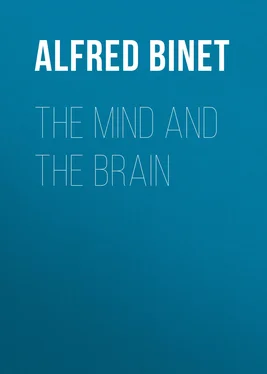Alfred Binet - The Mind and the Brain
Здесь есть возможность читать онлайн «Alfred Binet - The Mind and the Brain» — ознакомительный отрывок электронной книги совершенно бесплатно, а после прочтения отрывка купить полную версию. В некоторых случаях можно слушать аудио, скачать через торрент в формате fb2 и присутствует краткое содержание. Жанр: foreign_prose, foreign_religion, Философия, foreign_psychology, foreign_antique, на английском языке. Описание произведения, (предисловие) а так же отзывы посетителей доступны на портале библиотеки ЛибКат.
- Название:The Mind and the Brain
- Автор:
- Жанр:
- Год:неизвестен
- ISBN:нет данных
- Рейтинг книги:4 / 5. Голосов: 1
-
Избранное:Добавить в избранное
- Отзывы:
-
Ваша оценка:
- 80
- 1
- 2
- 3
- 4
- 5
The Mind and the Brain: краткое содержание, описание и аннотация
Предлагаем к чтению аннотацию, описание, краткое содержание или предисловие (зависит от того, что написал сам автор книги «The Mind and the Brain»). Если вы не нашли необходимую информацию о книге — напишите в комментариях, мы постараемся отыскать её.
The Mind and the Brain — читать онлайн ознакомительный отрывок
Ниже представлен текст книги, разбитый по страницам. Система сохранения места последней прочитанной страницы, позволяет с удобством читать онлайн бесплатно книгу «The Mind and the Brain», без необходимости каждый раз заново искать на чём Вы остановились. Поставьте закладку, и сможете в любой момент перейти на страницу, на которой закончили чтение.
Интервал:
Закладка:
By following up this idea, also, we might go a little further. We might arrive at the conviction that our present science is human, petty, and contingent; that it is closely linked with the structure of our sensory organs; that this structure results from the evolution which fashioned these organs; that this evolution has been an accident of history; that in the future it may be different; and that, consequently, by the side or in the stead of our modern science, the work of our eyes and hands—and also of our words—there might have been constituted, there may still be constituted, sciences entirely and extraordinarily new—auditory, olfactory, and gustatory sciences, and even others derived from other kinds of sensations which we can neither foresee nor conceive because they are not, for the moment, differentiated in us. Outside the matter we know, a very special matter fashioned of vision and touch, there may exist other matter with totally different properties.
But let us bring our dream to an end. The interest of our discussion does not lie in the hypothetical substitution of hearing or any other sense for sight. It lies in the complete suppression of all explanation of the noumenal object in terms borrowed from the language of sensation. And that is our last word. We must, by setting aside the mechanical theory, free ourselves from a too narrow conception of the constitution of matter. And this liberation will be to us a great advantage which we shall soon reap. We shall avoid the error of believing that mechanics is the only real thing and that all that cannot be explained by mechanics must be incomprehensible. We shall then gain more liberty of mind for understanding what the union of the soul with the body 9 9 See [Note 1] on p. 3 .—Ed.
may be.
CHAPTER IV
ANSWERS TO SOME OBJECTIONS, AND SUMMARY
I have set forth the foregoing ideas by taking the road which to me seemed the best. On reflection it has occurred to me that my manner of exposition and demonstration may be criticised much more than my conclusion. Now, as it is the conclusion alone which here is of importance, it is expedient not to make it responsible for the arguments by which I have supported it.
These arguments resolve themselves into the attestation that between objects and our consciousness there exists an intermediary, our nervous system. We have even established that the existence of this intermediary is directly proved by observation, and from this I have concluded that we do not directly perceive the object itself but a tertium quid , which is our sensations.
Several objections to this might be made. Let us enumerate them.
1. It is not inconceivable that objects may act directly on our consciousness without taking the intermediary of our nervous system. Some authors, the spiritualists notably, believe in the possibility of disembodied souls, and they admit by implication that these souls remain in communication with the terrestrial world, witness our actions, and hear our speech. Since they no longer have organs of sense, we must suppose that these wandering souls, if they exist, can directly perceive material objects. It is evident that such hypotheses have, up till now, nothing scientific in them, and that the demonstrations of them which are given raise a feeling of scepticism more than anything else. Nevertheless, we have not the right to exclude, by a priori argument, the possibility of this category of phenomena.
2. Several German authors have maintained in recent years, that if the nervous system intervenes in the perception of external objects, it is a faithful intermediary which should not work any change on those physical actions which it gathers from outside to transmit to our consciousness. From this, point of view colour would exist as colour, outside our eyes, sound would exist as sound, and in a general way there would not be, in matter, any mysterious property left, since we should perceive matter as it is. This is a very unexpected interpretation, by which men of science have come to acknowledge the correctness of the common belief: they rehabilitate an opinion which philosophers have till now turned to ridicule, under the name of naïve realism. All which proves that the naïveté of some may be the excessive refinement of others.
To establish scientifically this opinion they batter down the theory of the specific energy of the nerves. I have recalled in a previous page 10 10 See p. 22 , sup. —Ed.
of what this theory consists. I have shown that if, by mechanical or electrical means, our different sensory nerves are excited, notwithstanding the identity of the excitant, a different sensation is provoked in each case—light when the optic nerve is stimulated, sound when the acoustic, and so on. It is now answered to this argument based on fact that the nature of these excitants must be complex. It is not impossible, it is thought, that the electric force contains within itself both luminous and sonorous actions; it is not impossible that a mechanical excitement should change the electric state of the nerve affected, and that, consequently, these subsidiary effects explain how one and the same agent may, according to the nerves employed, produce different effects.
3. After the spiritualists and the experimentalists, let us take the metaphysicians. Among them one has always met with the most varying specimens of opinions and with arguments for and against all possible theories.
Thus it is, for example, with the external perception. Some have supposed it indirect, others, on the contrary, that it acts directly on the object. Those who uphold the direct theory are inspired by Berkeley, who asserts that the sensitive qualities of the body have no existence but in our own minds, and consist really in representative ideas. This doctrine is expressly based on this argument—that thought differs too much in nature from matter for one to be able to suppose any link between these two substances. In this particular, some authors often make an assertion without endeavouring to prove it. They are satisfied with attesting, or even with supposing, that mind can have no consciousness of anything but its own states. Other philosophers, as I have said, maintain that "things which have a real existence are the very things we perceive." It is Thomas Reid who has upheld, in some passages of his writings at all events, the theory of instantaneous perception, or intuition. It has also been defended by Hamilton in a more explicit manner. 11 11 See J. S. Mill's Examination of Sir Wm. Hamilton's Philosophy , chap. x. p. 176, et. seq.
It has been taken up again in recent years, by a profound and subtle philosopher, M. Bergson, who, unable to admit that the nervous system is a substratum of knowledge and serves us as a percipient, takes it to be solely a motor organ, and urges that the sensory parts of the system—that is to say, the centripetal, optic, acoustic, &c., nerves—do not call forth, when excited, any kind of sensation, their sole purpose being to convey disturbances from periphery to periphery, or, say, from external objects to the muscles of the body. This hypothesis, surely a little difficult to comprehend, places, if I mistake not, the mind, as a power of perception and representation, within the interval comprised between the external object and the body, so that the mind is in direct contact with external objects and knows them as they are.
It will be noticed that these three interpretations, the spiritualistic, the experimental, and the metaphysical, are in formal opposition with that which I have set forth earlier in these pages. They deny the supposition that the nervous system serves us as an intermediary with nature, and that it transforms nature before bringing it to our consciousness. And it might seem that by contradicting my fundamental proposition, those three new hypotheses must lead to a totally different conclusion.
Читать дальшеИнтервал:
Закладка:
Похожие книги на «The Mind and the Brain»
Представляем Вашему вниманию похожие книги на «The Mind and the Brain» списком для выбора. Мы отобрали схожую по названию и смыслу литературу в надежде предоставить читателям больше вариантов отыскать новые, интересные, ещё непрочитанные произведения.
Обсуждение, отзывы о книге «The Mind and the Brain» и просто собственные мнения читателей. Оставьте ваши комментарии, напишите, что Вы думаете о произведении, его смысле или главных героях. Укажите что конкретно понравилось, а что нет, и почему Вы так считаете.












